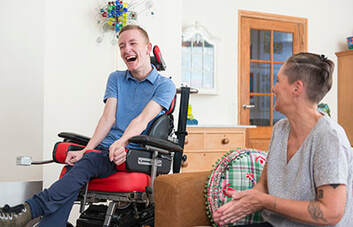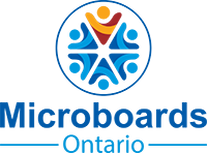Frequently Asked Questions
Below are some of the most common questions asked about Microboards.
Don't see yours? You can ask a question by sending an email to [email protected]
Don't see yours? You can ask a question by sending an email to [email protected]

Is a Microboard the same as guardianship?
A Microboard is not guardianship or a vehicle for substitute decision-making. . A Microboard has no control or legal authority over a person's life.
When is the best time to start a Microboard?
When you're ready! While many families begin thinking about it when a person approaches or turns 18, a Microboard can be started at any time. However, it is not a 'quick fix' - it does take time and consideration. Some of the key times families start a Microboard is when:
What are the benefits of having a Microboard?
A Microboard can help alleviate concerns third parties (financial institutions, health care practitioners, and government agencies) may have with contracting or interacting directly with the person who has a disability during a decision-making process. Click here for more information about the benefits of a Miroboard.
What role does a Microboard have?
A Microboard is a legal entity, just like any other non-profit. Therefore it is the perfect vehicle through which direct funding can be allocated, distributed and accounted for. The role of a Microboard, and its directors can be found here.
Do you have resources and templates for setting up a Microboard, like draft by-laws?
At present, Microboards Ontario does not have templates. One of the reasons for this is that each Microboard is as unique as each person, so a standard template for something like by-laws is difficult. However, we are working on resources that people can refer to that will provide an understanding of what is included; as mentioned, creating a Microboard isn't as straightforward as it seems. The best way to keep up to date on what Microboard Ontario has to offer is to subscribe to our mailing list.
What does it cost to form and sustain a Microboard?
There is a perception that Microboards are only for those with access to a lot of money. That's not the case. While there are some 'up front' costs, a Microboard can be incorporated easily and fairly inexpensively. As well, costs related to Microboards can be included in both Passport and Individualized Funding agreements.
One Time Costs in incorporating a Microboard include:
No! However, Ontario's laws around capacity and decision-making are due to be updated to reflect a more supported decision-making framework. We are working with our partners to encourage the government to update legislation, which was recommended by the Law Commission of Ontario in 2017.
What is an Independent Facilitator and do we need one?
An Independent Facilitator is a supportive person who not a Director but a paid professional. They help keep a Microboard moving forward, and support the person for whom the Microboard is for, ensuring their voice and wishes are understood. They also ensure that the values are upheld and provides context for those values. While not everyone chooses to have one, they are strongly recommended.
What are some of the legal responsibilities of being a Microboard?
The legal responsibilities for a Microboard are the same as they are for any non-profit organization including:
What are the Key Roles of Microboard Members?
Are there common values Microboards align to?
Yes! Click here for an overview of Microboards Principles and Values.
Still have questions?
Send us an email! We're happy to answer any questions or concerns or set up a meeting to talk about how a Microboard may be a good fit for your family or loved one.
A Microboard is not guardianship or a vehicle for substitute decision-making. . A Microboard has no control or legal authority over a person's life.
When is the best time to start a Microboard?
When you're ready! While many families begin thinking about it when a person approaches or turns 18, a Microboard can be started at any time. However, it is not a 'quick fix' - it does take time and consideration. Some of the key times families start a Microboard is when:
- Parents are beginning to think about support of their family member when they are no longer able.
- Personalized and innovative housing arrangements are being investigated.
- Siblings are transitioning into a primary support role.
- There is a need for ensuring a person has proper support for decision–making and relationship building.
What are the benefits of having a Microboard?
A Microboard can help alleviate concerns third parties (financial institutions, health care practitioners, and government agencies) may have with contracting or interacting directly with the person who has a disability during a decision-making process. Click here for more information about the benefits of a Miroboard.
What role does a Microboard have?
A Microboard is a legal entity, just like any other non-profit. Therefore it is the perfect vehicle through which direct funding can be allocated, distributed and accounted for. The role of a Microboard, and its directors can be found here.
Do you have resources and templates for setting up a Microboard, like draft by-laws?
At present, Microboards Ontario does not have templates. One of the reasons for this is that each Microboard is as unique as each person, so a standard template for something like by-laws is difficult. However, we are working on resources that people can refer to that will provide an understanding of what is included; as mentioned, creating a Microboard isn't as straightforward as it seems. The best way to keep up to date on what Microboard Ontario has to offer is to subscribe to our mailing list.
What does it cost to form and sustain a Microboard?
There is a perception that Microboards are only for those with access to a lot of money. That's not the case. While there are some 'up front' costs, a Microboard can be incorporated easily and fairly inexpensively. As well, costs related to Microboards can be included in both Passport and Individualized Funding agreements.
One Time Costs in incorporating a Microboard include:
- Legal incorporation costs - approximately $200
A non-profit can be incorporated provincially or federally. Federal incorporation is recommended. - Nuans non-profit corporation name search - $25
A Nuans search needs to be done for the name you choose for your Microboard. This is required to ensure that the name you select is not already in use.
- Directors and Officers Insurance (D & O) & General Liability Insurance- approximately $1,200/yr
Directors & Officers Insurance and General Liability protects the Microboard directors and the Microboard itself and is particularly important if the Microboard is managing money and is the employer of record (i.e., hiring staff) with Revenue Canada. It keeps individual Microboard directors protected in the event of disputes or accidents.
That said, some Microboards don’t always take insurance right away, as some Microboards aren’t assuming those responsibilities. However, it is great protection and highly recommended. Insurance is approximately $1,100 a year and many have successfully submitted that expense as an administrative expense (up to 10% of the budget). Microboards Ontario has been able to arrange competitive rates of D &O and general liability insurance through Arthur J. Gallagher Canada Limited. To see their rates and an application form, click here. Alternatively, you can contact Louise McConnell from Arthur J. Gallagher Canada Limited toll-free at 800.265.5956 ext. 3581 for more information. - Filing Tax and Incorporation Records - $220
Preparing your federal incorporation document on-line will cost approximately $200.00 and submitting your federal corporate return online will cost $20.00.
- Accounting and Administration
If the Microboard does not have a Director and/or anyone that is capable and willing to reconcile monthly financial and administrative records and annual reporting, this may have to be contracted out. - Legal
Some choose to have a lawyer handle all incorporation costs, and provide guidance around by-laws. While more expensive than filing for incorporation yourself, it can save a lot of time. - Human Resource Support
If the Microboard does not have a Director and/or anyone that is capable and willing to hire/contract, supervise, train and/or oversee Community Support Workers, this may have to be contracted out.
No! However, Ontario's laws around capacity and decision-making are due to be updated to reflect a more supported decision-making framework. We are working with our partners to encourage the government to update legislation, which was recommended by the Law Commission of Ontario in 2017.
What is an Independent Facilitator and do we need one?
An Independent Facilitator is a supportive person who not a Director but a paid professional. They help keep a Microboard moving forward, and support the person for whom the Microboard is for, ensuring their voice and wishes are understood. They also ensure that the values are upheld and provides context for those values. While not everyone chooses to have one, they are strongly recommended.
What are some of the legal responsibilities of being a Microboard?
The legal responsibilities for a Microboard are the same as they are for any non-profit organization including:
- Upholding the mission of the Microboard.
- Identifying officers of the Board; at minimum a President and Secretary/Treasurer.
- Notifying the government of changes to the board of directors.
- Keeping minutes of all meetings and where appropriate, financial statements prepared.
- Conducting an annual general meeting (AGM).
What are the Key Roles of Microboard Members?
- Be Part of Freely Given Relationships.
Members of the Microboard are not paid. They are there because they want to be. - Trust in the Person.
Microboard members trust that the person is able to express in some way what he/she wants and needs and will support him/her to make decisions and develop next steps. Everyone sets out to consider the person’s wishes, vulnerabilities, well-being, interests, gifts and strengths. - Act as Advisors.
Members act as a “think tank”, offering ideas and exploring connections and opportunities with the person. They actively help find resources and act as an ally to the person when they are needing and wanting support with advocacy. - Deepen Connections.
Members of the Microboard spend time with the person with the intention to better understand and get to know what matters most to him/her and to build a deeper connection. - Respectful Collaboration.
Members work collaboratively and respectfully with one another and show utmost regard for the person and all those who are in his/her broader social network.
Are there common values Microboards align to?
Yes! Click here for an overview of Microboards Principles and Values.
Still have questions?
Send us an email! We're happy to answer any questions or concerns or set up a meeting to talk about how a Microboard may be a good fit for your family or loved one.











